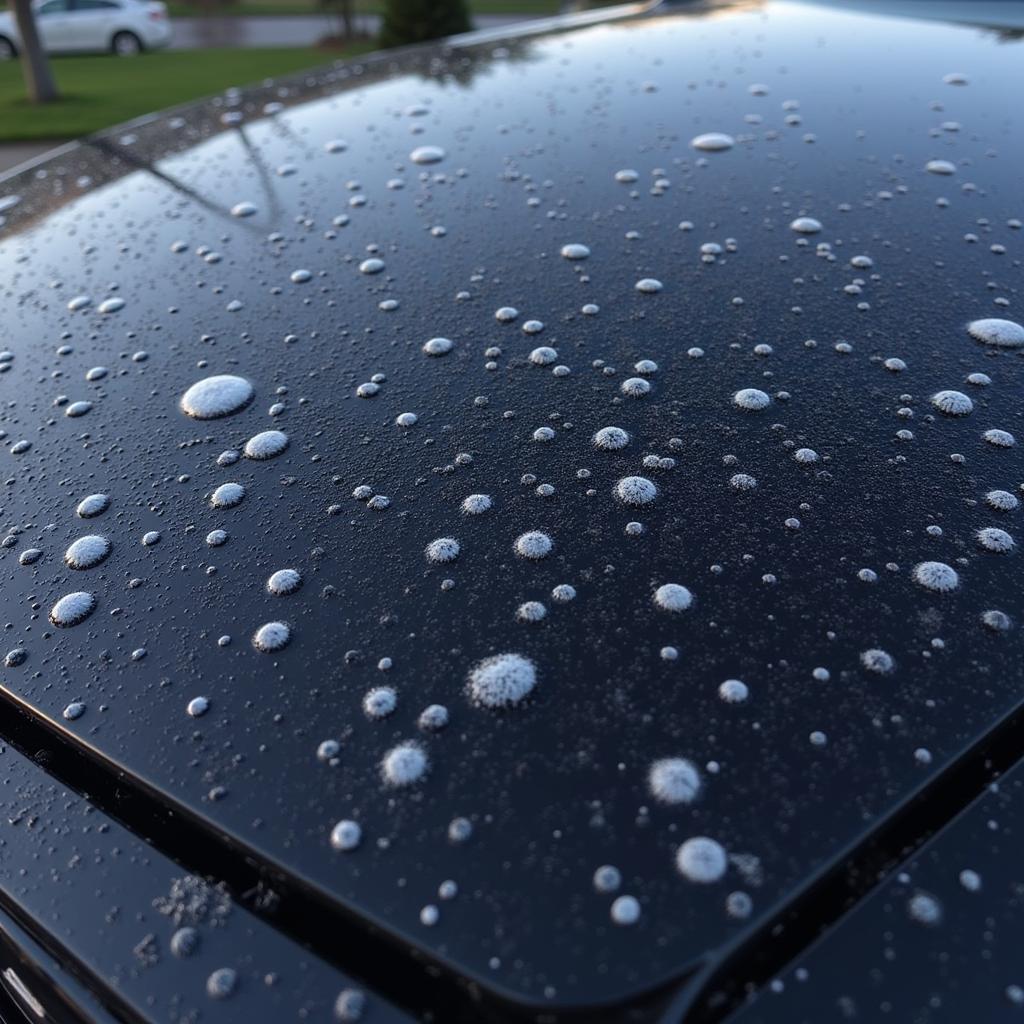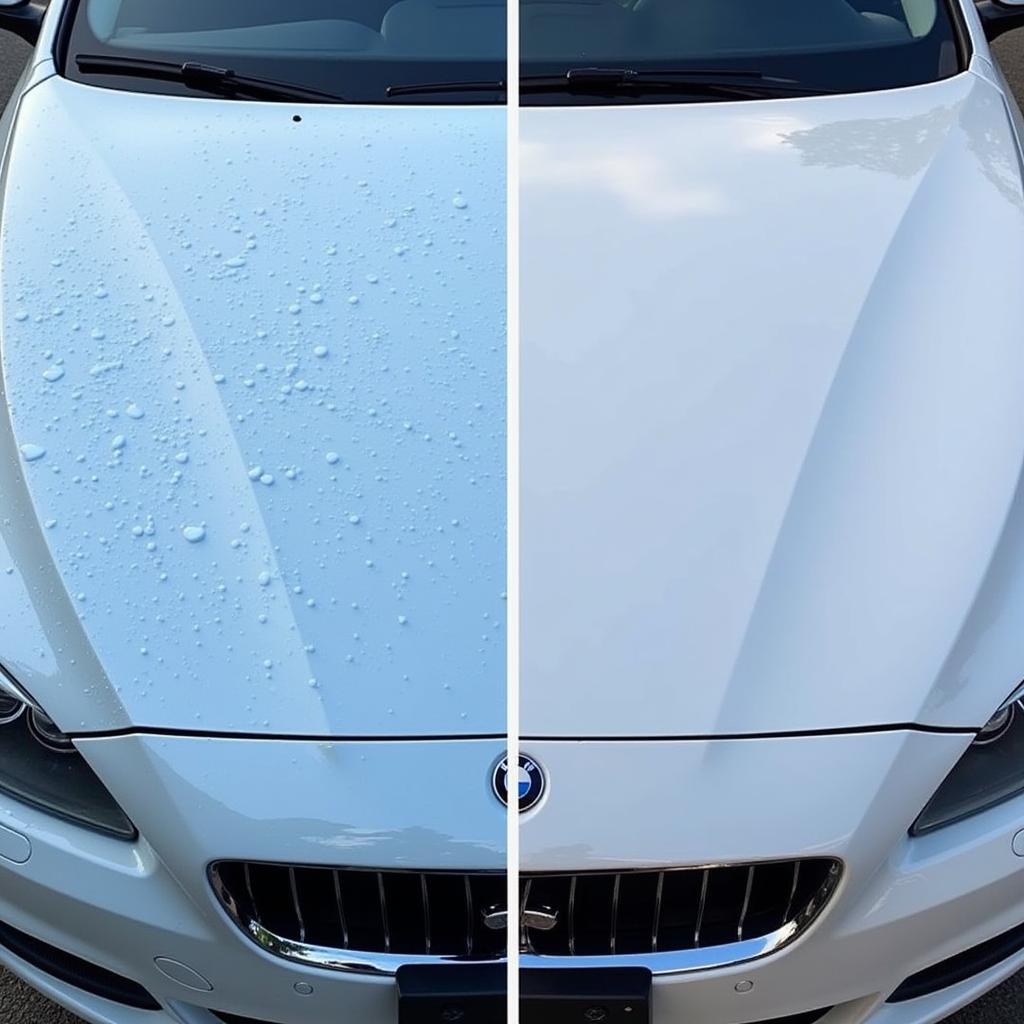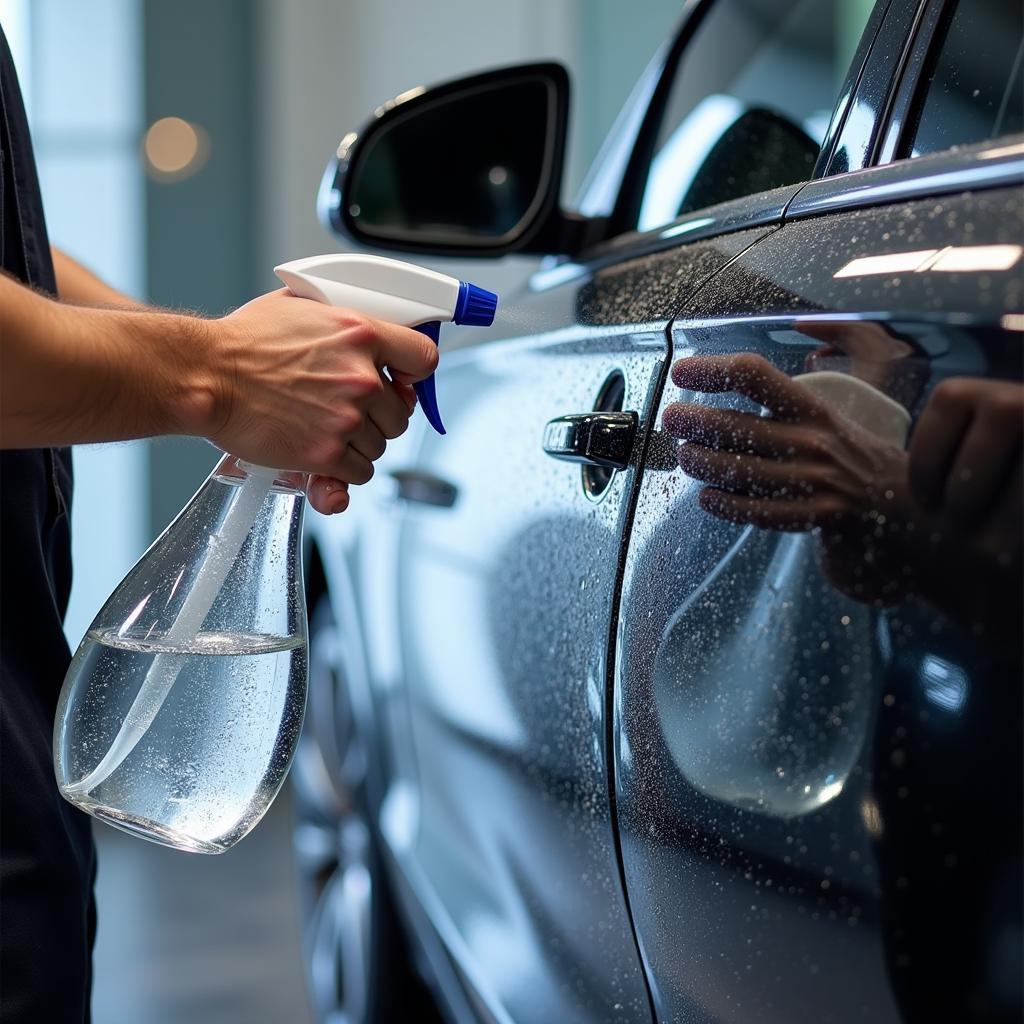What water do you use when you detail a car? The type of water you use for car detailing can significantly impact the final result. Using the wrong kind of water can leave spots, streaks, and even damage the paint. Let’s dive into the best water choices for achieving a showroom-worthy finish.
The Importance of Water Quality in Car Detailing
Water is arguably the most crucial element in car detailing. It’s used in virtually every step, from the initial wash to the final rinse. Therefore, understanding the properties of different types of water and how they interact with car surfaces is fundamental to achieving a flawless finish. Using the correct water can be the difference between a sparkling clean car and one covered in unsightly water spots.  Car Wash with Hard Water Spots
Car Wash with Hard Water Spots
Using hard water, for instance, can leave mineral deposits that dull the paintwork and are difficult to remove. how to wash and detail your car explains the proper washing techniques in detail. Soft water, on the other hand, minimizes these issues. Beyond the basic wash, the type of water used in other detailing processes, like applying ceramic coatings or rinsing off cleaning solutions, also plays a vital role in the final outcome.
Why Tap Water Isn’t Always Ideal
While convenient, tap water often contains minerals like calcium and magnesium, which contribute to water hardness. These minerals can leave unsightly spots and streaks after drying, especially on dark-colored cars. Imagine spending hours meticulously detailing your car only to be greeted by a surface marred by water spots!  Comparing Tap Water vs Filtered Water Car Wash
Comparing Tap Water vs Filtered Water Car Wash
This is why professional detailers often invest in water filtration systems. These systems remove impurities and minerals, resulting in a cleaner rinse and a spot-free finish.
The Best Water for Car Detailing: Filtered and Purified
So, what water should you use? The ideal choice for car detailing is filtered or purified water. This can be achieved through various methods:
- Reverse Osmosis (RO) Water: RO systems effectively remove a vast majority of impurities, producing extremely pure water ideal for rinsing and final detailing steps.
- Deionized (DI) Water: DI water is similar to RO water but undergoes an additional process to remove virtually all ions, making it exceptionally pure and perfect for sensitive applications like applying ceramic coatings.
- Distilled Water: While not as pure as RO or DI water, distilled water is still a significant improvement over tap water, offering a relatively clean rinse that minimizes spotting.
Setting Up a Water Filtration System
Investing in a water filtration system can significantly enhance your detailing results. While RO/DI systems are the gold standard, even a simple deionizing filter can make a noticeable difference. what products are used for car detailing provides more information on the tools and equipment used in professional detailing. These systems connect to your water supply and filter out minerals, ensuring a pure water source for your detailing needs.
Other Water Options and Considerations
While filtered water is the preferred choice, there are other options to consider:
- Soft Water: If you live in an area with soft water, you’re already a step ahead. Soft water contains fewer minerals than hard water, reducing the risk of water spots.
- Washing with a Drying Aid: Using a drying aid can help minimize water spotting even with tap water. These products work by sheeting the water off the car’s surface, reducing the chance for minerals to dry and leave spots. how does car detailing work offers a deeper understanding of the various processes involved in car detailing.
“Using the right water is a game-changer in car detailing,” says renowned detailing expert, Mark Johnson. “It not only enhances the final finish but also protects the paintwork from long-term damage.”
What about well water?
Well water can vary significantly in its mineral content and should be tested for hardness before use. In most cases, filtration is necessary to remove impurities and prevent spotting.
 Car Detailing with Filtered Water Spray
Car Detailing with Filtered Water Spray
“Investing in quality water is an investment in the longevity of your car’s finish,” adds Sarah Miller, a seasoned car care specialist. She emphasizes that “Even the best detailing products won’t perform optimally if used with contaminated water.”
Conclusion
What water do you use when you detail a car? The answer is clear: filtered or purified water is the best choice for achieving a flawless, spot-free finish. While tap water can be used in a pinch, it’s crucial to understand the potential drawbacks and take steps to mitigate water spotting. By prioritizing water quality, you’re not only enhancing your car’s appearance but also protecting its paintwork for years to come. what size shop vac for car detailing offers guidance on choosing the right vacuum for your detailing needs.
FAQ
-
Can I use rainwater for car detailing? While rainwater is naturally soft, it can contain pollutants and is not recommended for detailing.
-
How often should I change the filters in my RO/DI system? Filter replacement frequency depends on usage and water quality, but typically every 6-12 months.
-
What’s the difference between RO and DI water? DI water is further purified than RO water, removing virtually all ions.
-
Is filtered water necessary for every detailing step? While most beneficial for rinsing, using filtered water for all steps will yield the best results.
-
Can I use bottled water for detailing? Bottled water is a viable alternative to tap water but can be expensive for large-scale detailing.
Need help? Contact us via WhatsApp: +1(641)206-8880 or Email: [email protected]. Our customer service team is available 24/7.

Leave a Reply